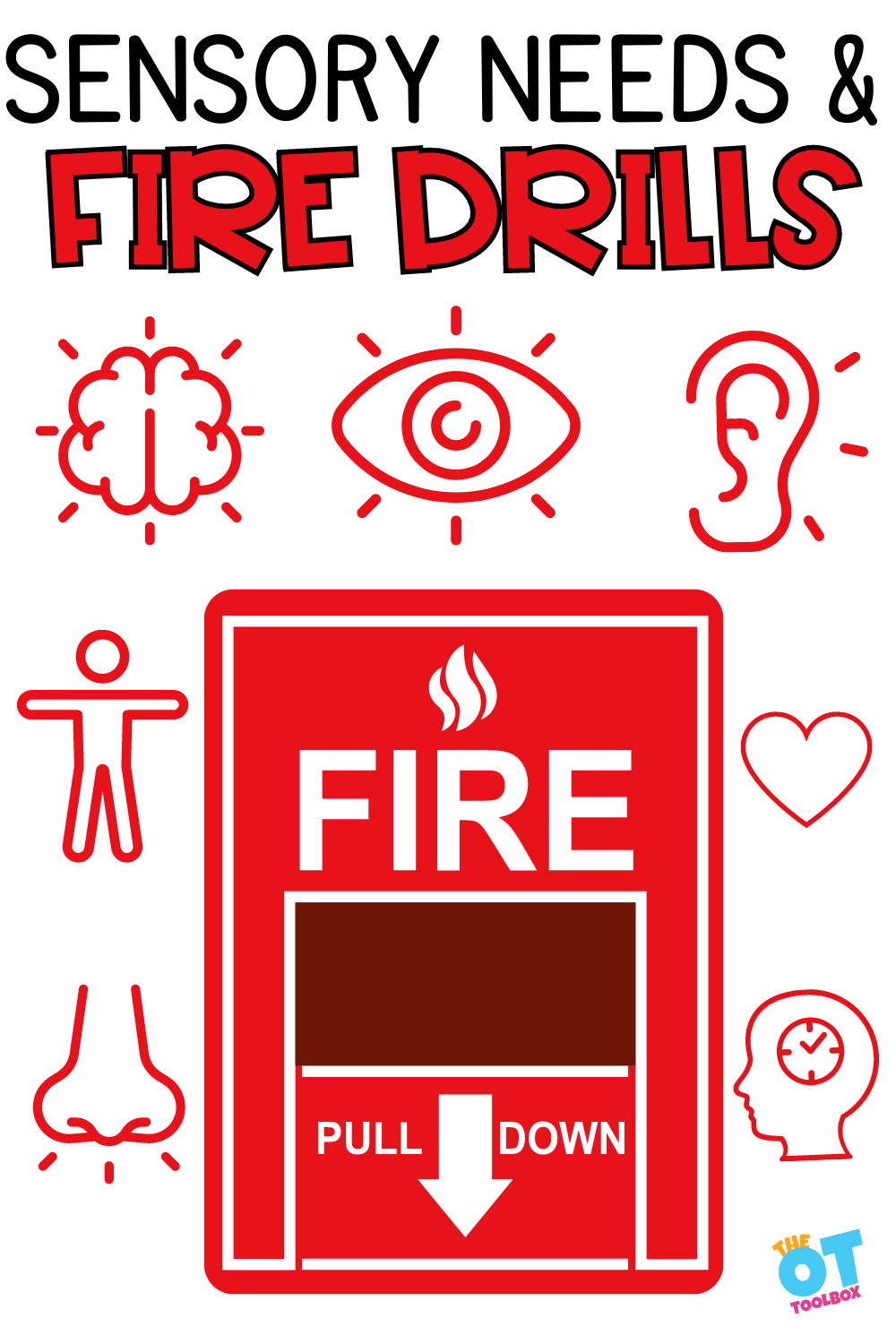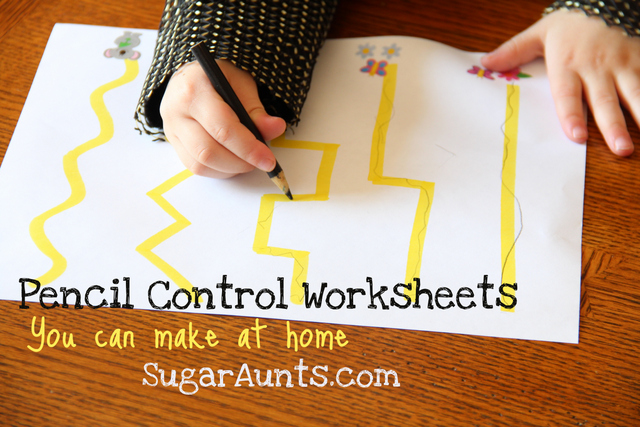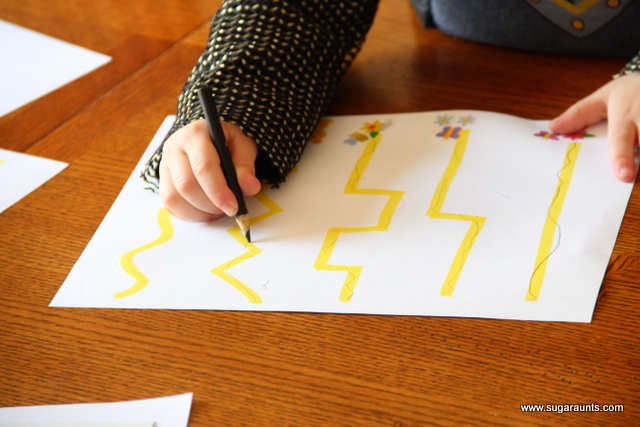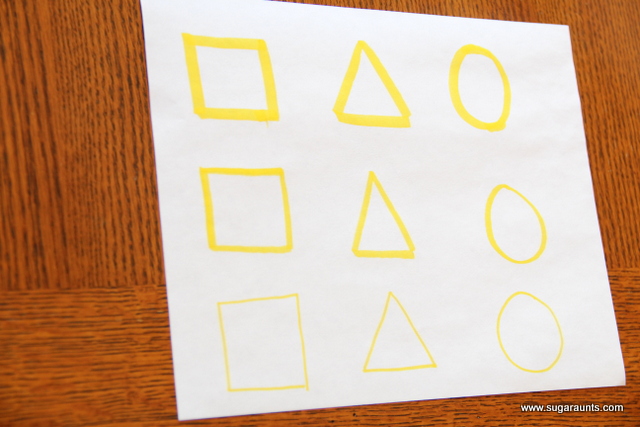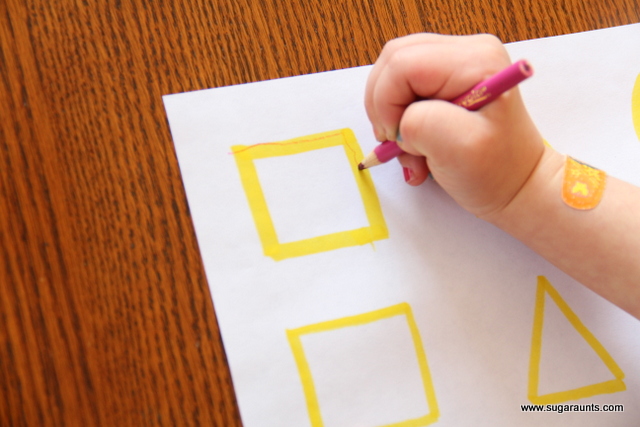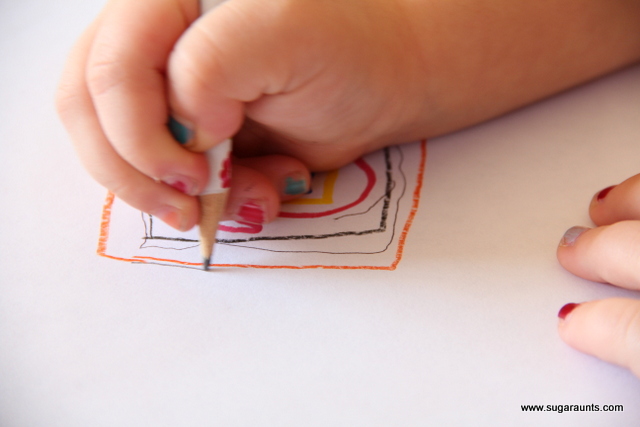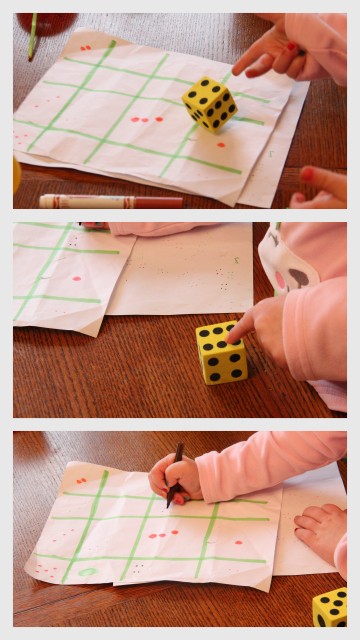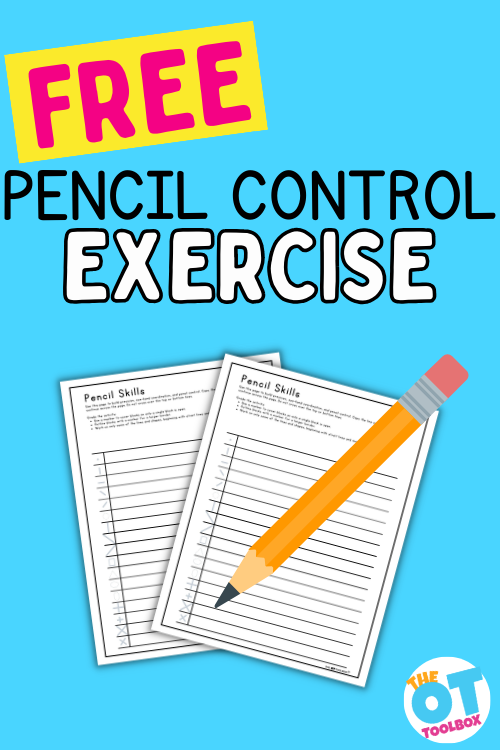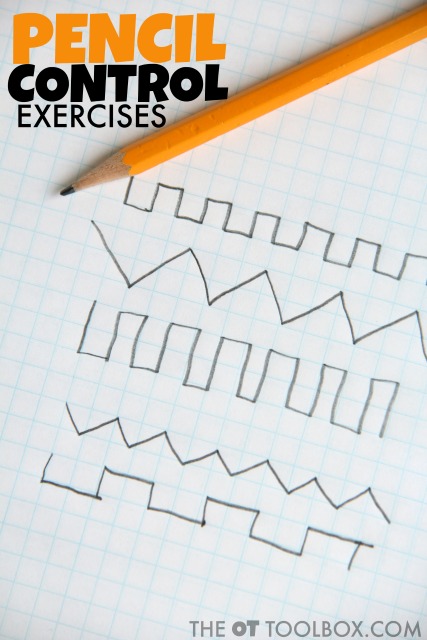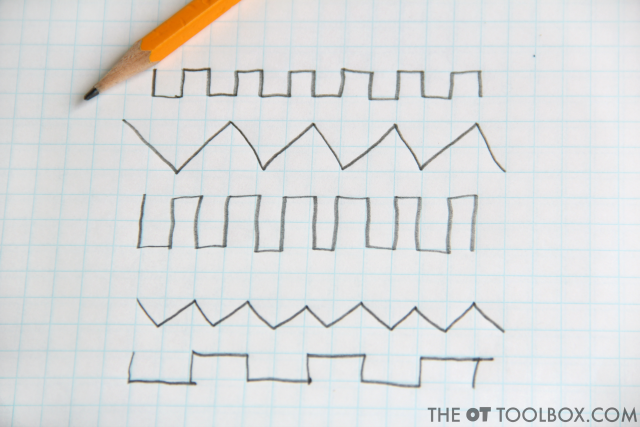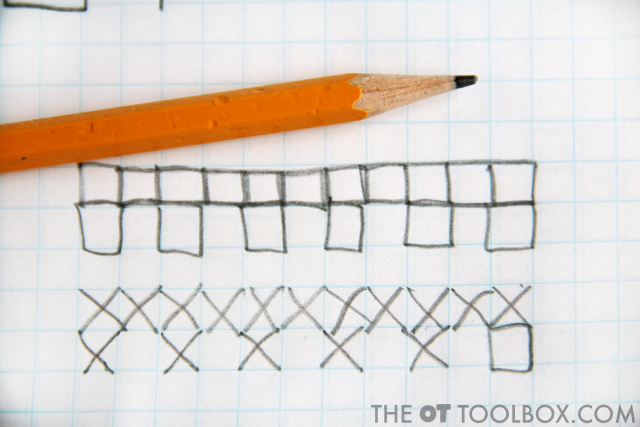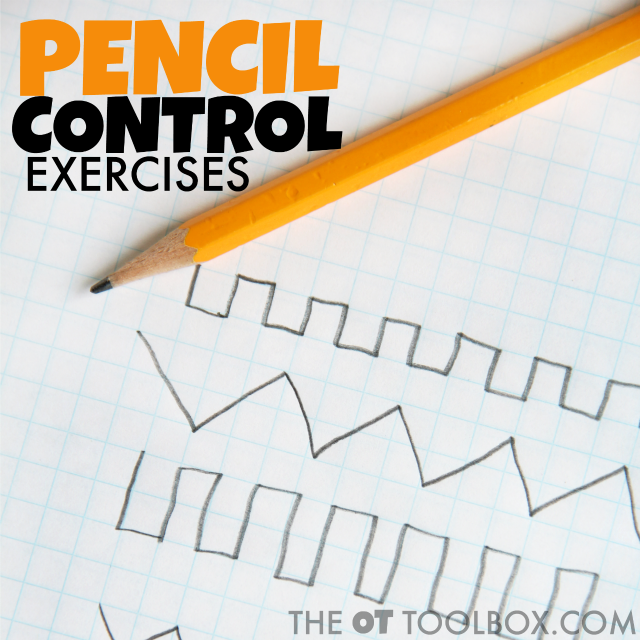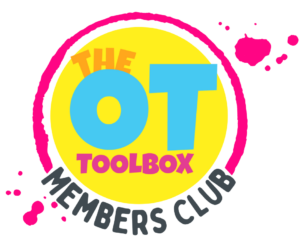Part of handwriting legibility is the visual motor skills needed for pencil control and one tool in our toolbox are pencil control worksheets. Pencil control in isolation isn’t always addressed, but actually focusing on the refined pencil strokes and controlled movements of the pencil makes a huge difference in overall legibility. In this blog post, you’ll find many pencil control worksheet ideas and even have the ability to access a few of our favorites.
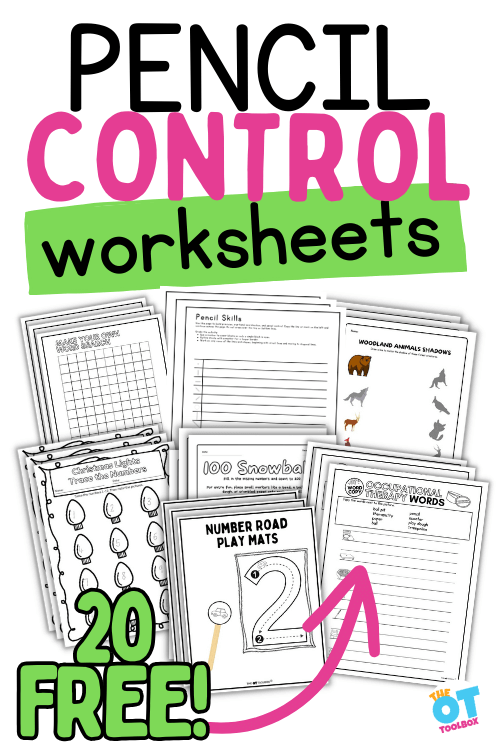
Pencil Control Worksheets
Pencil control worksheets, or printable PDFs that target specific visual motor skills needed to move the pencil with precision and refined movements are tools that support handwriting.
When we use pencil control worksheets, it’s more than just moving the pencil to make marks.
Pencil skills worksheets can target many aspects of writing with a pencil:
- Making small lines within a given space
- Moving the pencil within a given space on a paper with presence of finger dexterity
- Writing a letter on a small space, such as on our code breaker worksheets
- Tracing over lines (Read here about the benefits of tracing lines)
- Using precise movements in order to re-trace over letters when forming the alphabet correctly (letters like h, m, n, and r have re-trace where the pencil moves over an already formed pencil line).
- Erasing the pencil marks
- Writing with an appropriate and legible pencil pressure
- Fluid and coordinated pencil strokes
Using worksheets to target specific skills like practicing letter formation isn’t always ideal. The occupational therapy practitioners may actually sway away from rote handwriting practice.
We’ve all seen it: A child is copying letters on a worksheet and the letters progressively get worse as they go across the page…or the margin creeps in as the child writes down the paper.
That is not to say that all letter formation worksheets are bad! In fact, we LOVE to target specific skills using letter writing practice on printable PDFs.
The OT trick is to facilitate the underlying skills, special themes that make the worksheet fun and engaging, and even using interactive worksheets that support skills in games or play-based learning.
The multisensory aspect is what turns an ordinary writing worksheet into a therapy tool!
All of these reasons are why using pencil control worksheets are great ways to target specific skills leading to handwriting legibility and functional writing skills.
Below, you’ll find ideas to make DIY pencil control worksheets, and then some of our favorite pencil control sheets. You can also grab a printable pencil control worksheets pdf at the very bottom of the page.
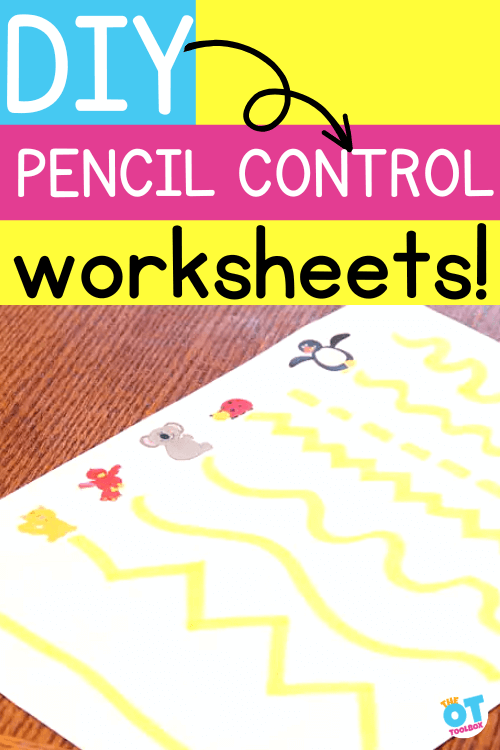
DIY Pencil Control Worksheets
The ideas below are some of our favorite ways to create your own DIY pencil control worksheets.
Does your school-aged child have difficulty with line awareness, pencil control, or letter formation? Is your preschooler just learning to control the pencil while making straight lines, the diagonal lines of an “X” or the angled, connecting lines of shapes like a square, rectangle, or triangle? Do you know a child who is learning to control the “wobble” of the pencil while making a circle that connects the start to the finish?
All of these are pencil control skills!
It is easy to make fun worksheets that apply to your child’s needs/age-appropriate level/skills…and interests!
To make your own worksheets, you need just a few items:
- plain paper
- lined paper
- graph paper
- marker or highlighter
- markers
- pencil
- stickers
- dice
You don’t need to use all of these items…the activities below can be created over the course of several days or weeks. Pick and choose an activity and then go from there!
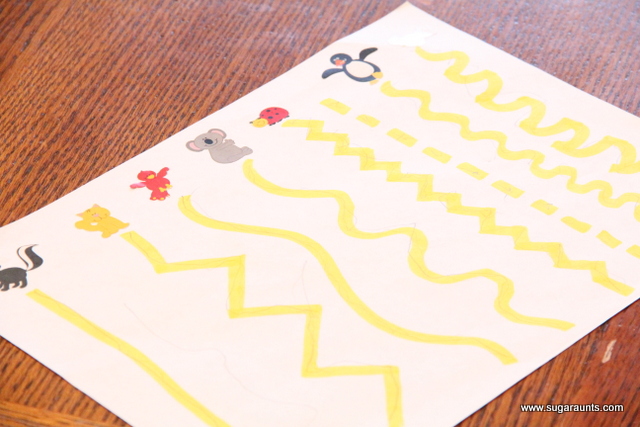
DIY Pencil Control Sheet with Stickers
- Use a highlighter to make straight, angled, and curvy lines going across the page…or add different twists and turns for your older child to trace along.
- Grade the activity with the line width. Use thicker lines for a new writer and the school-aged child can work on very thin lines.
- Add a sticker at one end of the line. You can also add another sticker at the other end of the line if you like.
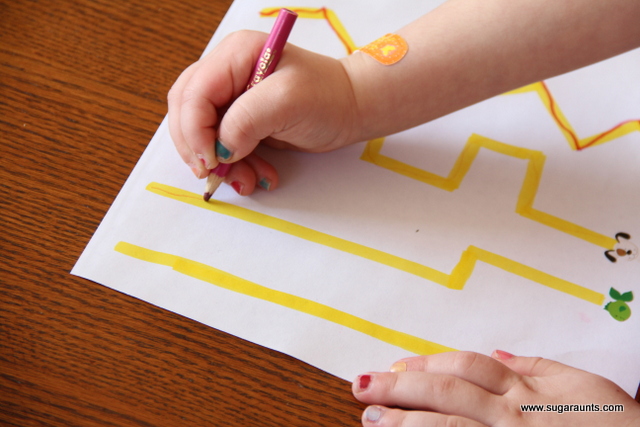
Graded Pencil Control Activity
- Consider orientation: By changing the direction of the lines, you can target different skills.
- Lines that start at the top of the page and go down toward the child’s body are easiest. Start there. Consider placing this style of worksheet activity on a slant board or vertical surface for strengthening, support, or upper body positioning.
- Lines that go from left to right across the page cross the midline. This is a need for many children and can also target visual scanning skills. Also check out our blog post on crossing midline activities for preschoolers for the younger ages.
- Consider using all curved lines or all angled lines, depending on the needs of the individual.
DIY Pencil Control Sheets- Shapes
- Straight lines
- Starting the pencil at a certain point
- Stopping the pencil at a certain point
- Diagonal lines of an “X”
- The angled, connecting lines of shapes like a square, rectangle, or triangle (making a sharp corner)
- Smooth pencil strokes to create a curved line of a circle
- Connecting shapes completely to close the shape
- Hand strength and endurance to color in the shapes
- Lifting the pencil and placing it on a specific point (Like adding a triangle to the top of a square to create a house, which is a skill needed to form some letters like adding the middle line to an “A”)
DIY Pencil Control WORKSHEET with Line Awareness
- Use a blank piece of paper and using a marker, draw a shape such as a square.
- Draw a square around it.
- Take turns with your child to make larger and larger shapes.
This activity is an easy way to work on pencil control skills using pre-writing shapes, but also focuses on the sharp angle of lines as they turn a corner.
When the child makes the shape around your shape, they can work on pencil control for evenly spaced pencil strokes.
DIce Pencil Control Worksheet
- Blank paper
- Marker
- Dice
- Pencil, crayon, or marker
You can work on so many skills with this activity. Counting, Copying, and Drawing with accurate spacing all work on her visual perceptual skills and spatial awareness.
Set this activity up by:
- Draw lines to create a large grid on the paper.
- Roll a dice. We used a large dice but a regular game dice would work too.
- Count the dots on the dice using the point of the pencil. Touch each dot. (A GREAT activity for targeting graded precision skills with the pencil)
- Then draw the dots on the paper in one of the spaces. Draw the dots exactly as they are on the dice.
Printable Pencil Control Worksheets
Printable pencil control PDFs are an easy way to work on skills in therapy. You can print off a handful of the worksheets for your therapy caseload and use them in a variety of ways to target different OT goals and by grading the activities.
In The OT Toolbox Membership Club, we have over 130 printable pencil control worksheets (along with a thousand+ other skill-building activities and PDFs!). Membership Club members can log in and then head to our Pencil Control Skill to access them all.
Some of our favorites include:
- Pencil control mazes
- Dot games
- Simple line printables
- Eraser skill PDFs
- Pencil control roads
- Mazes
- Connect the dot PDFs
- Pre-writing pencil mazes
- Pencil shading worksheets
- Pencil line drawing activities like adding textures, dot features, or symmetry activities
- Word search printables
- Connect the matching items
- So many more!
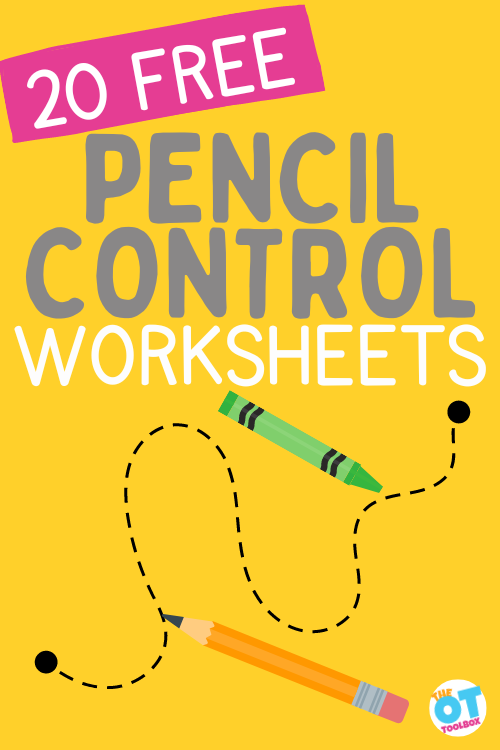
20 Free Pencil Control Worksheets
To get some printable pencil control worksheets, head to these blog posts. Each one addresses various aspects of handwriting skills, but in them, you can get a free printable pencil control PDF.
To get these printable worksheets, simply go to the bottom of the blog post and enter your email address into the form. (Each printable is also found in Level 1 of our membership, where are all “freebies” can be found. Level 2 members also get this benefit as well).
- Pencil Control Exercise– Copy pre-writing lines and shapes in a given space, between writing lines
- OT Coloring Pages– target hand strength and coloring in the lines
- Copy OT Words onto lines
- Mitten I Spy and Writing Pages– Color the shapes with a colored pencil and then write the words on the lines
- Number Formation Worksheet– Trace numbers on the shaded numbers
- Winter Color By Number– Color in the given space with controlled pencil/crayon motions
- New Years Maze– Keep your pencil in the path of the lines
- Number Road Playmats– Great for pencil control when making numbers
- Blank Word Search– Place letters inside the squares of the wordsearch grid
- 100 Snowballs Worksheet– Place numbers inside the circles
- Snowball Letter Practice– Trace letters on snowballs
- Holiday Lights Letter Tracing worksheet
- Hannukah Word Scramble– write the letters in the boxes
- Christmas Word Match– write the letters in the boxes
- Arctic Animal Word Search– circle single letters or the words to work on pencil skills
- Shadow Matching Worksheet– Connect the matching animals with pencil lines
- Dinosaur Worksheet– Connect the matching dinos with lines
- Owl Directed Drawing– Use pencil lines to create a simple owl
- Cotton Swab Art PDF– Break a cotton swab in half and use it to dot the lines
- Fine Motor Writing Sheets– Place play dough or small objects in the dots…or mark each dot with an X to fill the picture. Then write on the lines
For more resources, check out our library of letter formation worksheets. These printables are free and can be used to target a variety of skills.
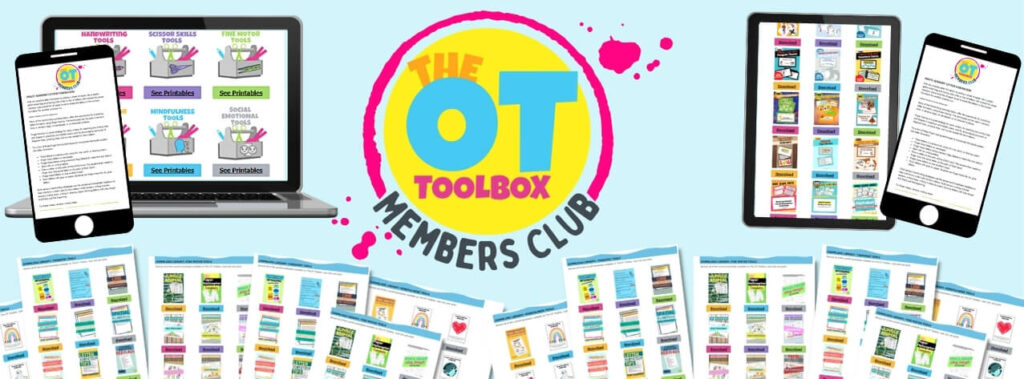
Get all of the items listed above when you join The OT Toolbox Member’s Club! Free printables are available in our Level 1 membership and the freebies PLUS 1500+ more printable tools are available in our Level 2 membership!
Join The OT Toolbox Member’s Club today!



Colleen Beck, OTR/L has been an occupational therapist since 2000, working in school-based, hand therapy, outpatient peds, EI, and SNF. Colleen created The OT Toolbox to inspire therapists, teachers, and parents with easy and fun tools to help children thrive. Read her story about going from an OT making $3/hour (after paying for kids’ childcare) to a full-time OT resource creator for millions of readers. Want to collaborate? Send an email to contact@theottoolbox.com.

